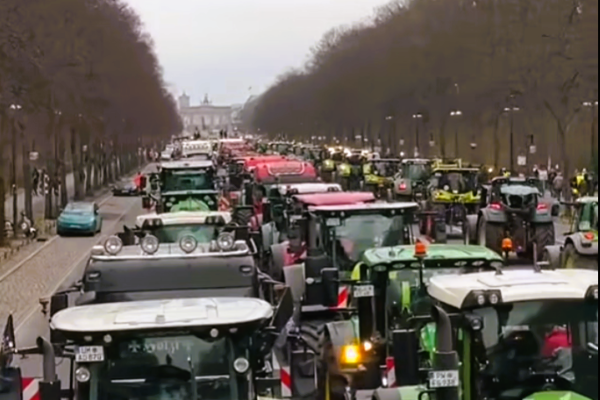Farmers in Germany have initiated widespread protests, utilizing tractors and trucks to block roads across the nation in opposition to the government’s proposed cuts to tax breaks for the agricultural sector. Convoying with banners proclaiming “No beer without farmers,” protesters gathered on roads in sub-zero temperatures to voice their concerns.
In Berlin, the city center witnessed dozens of tractors and lorries stationed at strategic points, sounding their horns in a symbolic display of discontent at the commencement of a planned week of action. Road blockades, including multiple border crossings with France, led to significant traffic jams during the morning rush hour, as reported by German Police.
The farmers’ grievances stem from the government’s plans to eliminate two tax breaks, a move they argue will push them out of business. The German government, compelled to identify budget savings for 2024 following a court ruling in November, faced a challenge in reallocating spending plans. Farmers contend that the burden of these cuts has been unfairly imposed on them, prompting them to stage protests and road blockades.
Farmers began gathering on Sunday evening at the Brandenburg Gate landmark in Berlin’s government quarter, setting the stage for a week of coordinated actions. Their objective is to draw attention to the potential consequences of the proposed tax changes and seek a reconsideration of the measures they perceive as detrimental to their livelihoods.
Last week, as farmer protests gained momentum, the coalition government led by Chancellor Olaf Scholz made unexpected amendments to the budget. The modifications included adjustments to plans to reduce subsidies for agriculture, responding to the growing discontent among farmers.
Under the revised amendments, the subsidy on agricultural diesel will undergo a 40% cut this year, followed by a 30% reduction in 2025, ultimately ending in 2026. While these adjustments were introduced in response to the protests, a government spokesperson clarified on Monday that no further changes were being considered.
“In the end, a government has to decide and has to lead the way, and that can’t always be to everyone’s satisfaction,” stated the government spokesperson, acknowledging the challenges of balancing diverse interests.
The week ahead in Germany is anticipated to witness continued protests, as rail workers are set to launch a three-day strike on Wednesday. The strike is part of broader industrial action across sectors, with workers seeking a pay rise to offset the impact of months of significant inflation.
Workers in various industries, including metallurgy, transport, and education, have resorted to strikes and demonstrations in recent weeks, reflecting a broader trend of labor discontent. The protests underscore the complex task facing the German government in navigating economic challenges and addressing the concerns of diverse sectors amidst budgetary constraints.
As road blockades persist and industrial actions intensify, the German government remains under pressure to find a delicate balance that ensures fiscal responsibility while addressing the legitimate concerns of different segments of society. The outcomes of these protests and strikes are likely to influence ongoing policy decisions and shape the dynamics of social and economic dialogue in Germany.
